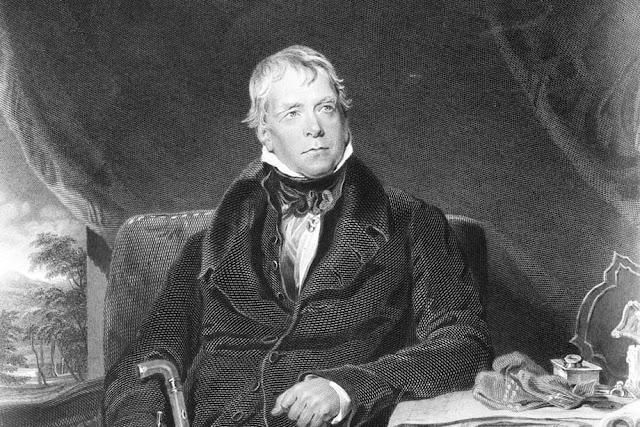“pervasive, second-rate sentimentalist, associated with tartan nostalgia.”
For Walter Scott - “the past is gone, beyond recall.” ….it evokes a national past never to revive it.”
.... no part of political or social mobilization of present by a mythical emphasis on
Walter Scott’s novels were read across the world, and his contribution to the rising tide of national romanticism, was a great one. – “however it was great everywhere but in his own nation of Scotland.” Scott wrote of a “romantic national culture and the rise of a kitsch Scotland.”
Tom Nairn, leading political theorist, denounces Scots novelist Walter Scott- ..”the destruction of Celtic Scotland was to haunt Lowlanders or the Scotland of Sir Walter Scott. He showed us “how not to be nationalist during an ascendant political nationalism. Its the language of Tory unionism and of progress”/
“From Ossian to Walter Scott played a large part in generating and defining romantic consciousness for the rest of Europe while degrading his own nation. Which led to rootlessness, a void, which cultural and literary historians deplore. The continuity between (heroic) past and present.”….... The heart may regret but never the head.”
Nairn writes of the failures of Scottish Nationalism, during the 1800s under the false romantic myths such as the writing of Walter Scott and of a bereft Scottish literature at this time. Two examples – cultural emigration and the Kailyard school of vulgar tartanry.”,,,
Scotland reverted to being a province 1800s, while prosperous and imperial. Why? Scotland became void and rootless. 1. Absence of political nationalism 2. Absence of a mature cultural romanticism. The poor Highland's world and comparatively prosperous Lowland world, and the total repression of Highland culture and social structure. The highland were once half of the population of Scotland.
 |
| Scott monument Edinburgh |
By contrast the real purpose of romantic history was different – cultural nationalism was the mythical resuscitation of the past, to serve the present and the future.
Scott caused disintegration of a great national culture. Elsewhere in Europe, “the middle classes felt the development for people was impossible without rapid mobilization of their own resources and rejection of alien rule.”
Nairn claims Scotland is unique in Europe, where nationalism struggled with its national identity and along with the rise of nationalism 1800s and the rise of nation states across Europe, as the "result of the uneven development of capitalism."
That the Scottish Enlightenment was very much a Tory project. While Scotland prospered during the 1800s with manufacturing, its literary voice became bereft. He sees Walter Scott’s work of a mythical Scotland and Scots heroes, as very much glorifying a past that was gone and to be forgotten. Scotland became north Britain. While Scott’s romantic and mythical novels were highly successful across the world.
The real interests of Scotland diverge from the auld sang

